How to use Artificial Intelligence (AI), and services like ChatGPT, Copilot or DeepL, to learn French or another foreign language? In this post, I share good practices and attention points to get the best of those technologies and learn efficiently.
I’ll share cases where these services are not that efficient, with actual examples I tried myself, and a ready-to-use prompt to avoid some pitfalls.
Hey, did you know all my articles are available in French? If you’re trying to improve your reading, I advise you to read the original, French-only version, and only use the English version for support, if needed. Please need the English versions are not literal translations.
Practice reading or chatting in a foreign language with AI
The opportunity with conversational AI services, likes Copilot and ChatGPT is that you can have a chat with them. You can launch a conversation and practice reading and asking questions. It can help you get more confident in the language, before starting a written conversation with real people.
Advantages
- You don’t have to wait for someone to be available, you can start a conversation whenever you please.
- You can prompt the AI agent to change their tone (colloquial, professional…).
Limits
- Answers will never be as authentic as human ones! Even when prompted to reply naturally, as if talking with a friend, this automated solution will never actually sound like a true human.
- It will not tell you if you made mistakes, unless you specifically ask to do so (I’ll cover this further in the article).
Example
Here’s a conversation I generated with ChatGPT*. I start in a really simple way, like I would if I was talking to a someone I know. However, it quickly appears that the conversation is unnatural, typically what you would find in a textbook.
As a native French speaker, the style seems odd to me. Sentences are rather classic, until the word “chiller” (a word from English origin that recently appeared in the French dictionary) comes up. This word seems out of place in the conversation, because the tone and style of that last sentence is different from the rest.
*Unless otherwise stated, all screenshots date from January 2025

Then, I deliberately make a typo. I write “tant” instead of “temps”. If I’m paying attention, I can see that it used a different word than the one I used in my question. However, it doesn’t explicitly mention it, since I didn’t ask.
Its style is not natural at all at this point. We hardly use bullet points in colloquial conversations. The generative AI is writing as if composing an article for a blog or magazine.
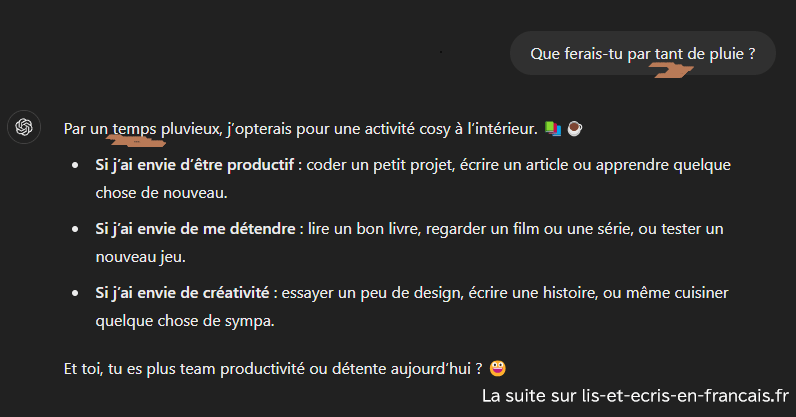
Then I request it to change its tone. By default, it tries to define the appropriate tone based on my initial prompt, but I can make it change during the conversation. In this example, I ask it to switch to a professional tone.
It answers again in a magazine-like way, with bullet points.
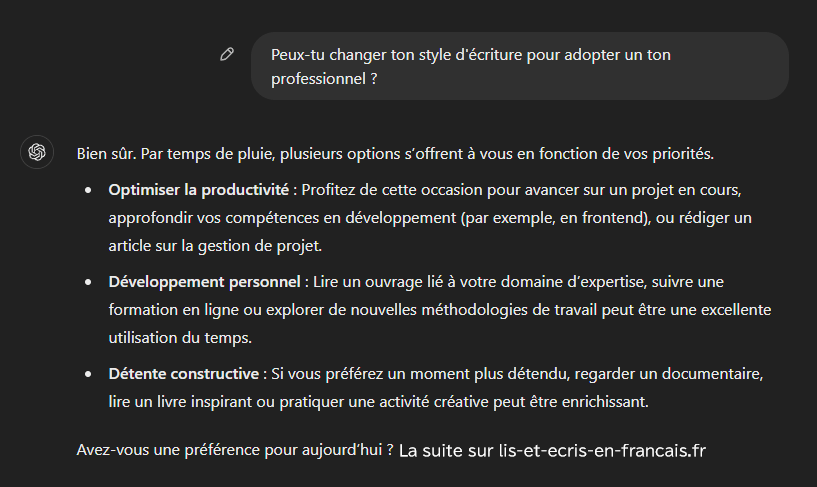
I prompt it to switch to a friend-like tone, as if it was a millennial having a written chat conversation, and I ask a new question.
Here, the tone and style are not natural at all anymore, it becomes packed with clichés, because it heavily utilizes expressions like “genre”, “franchement”, “cramer”… I’m a millennial myself, and it’s been years since I actually used or hears some of those expressions. There are also some I’ve never ever heard or read, like “ça bosse les bras”. I’m pretty sure it was never actually used by a human.
In natural French, we would say “ça travaille les bras”. In some cases, “bosser” is a colloquial synonym of “travailler”, but it doesn’t work in this particular context.
And again, it heavily uses bullet points, which makes the conversation unrealistic, although I specifically asked that it behaves as a humain having a written conversation.
✅See actual chat conversations in authentic French on this blog.
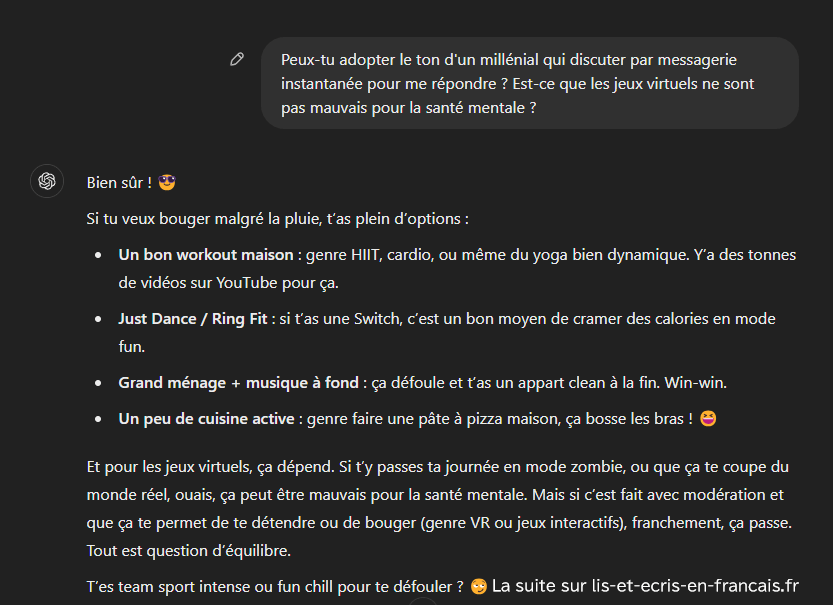
Having AI correct our French
Gen AI can also be used to correct something you wrote in French, or check that you made good use of a word or expression you discovered.
Advantages
- It’s easier than looking for grammar rules and studying them: the answer comes instantly.
- It’s easier than using a search engine and go through results.
(But please be aware, it’s really bad for the environment…)
Limits
- Corrections are not always… correct! And the justification are sometimes totally made up. Just try to tell it it’s wrong: it will just make up a new justification!
- If you don’t memorize the grammar, you’ll never be able to use it. By relying on the easiest solution (AI), you brain gets lazy and doesn’t try to remember what it encounters.
- French grammar is not always (not often…) black or white: there are many exceptions and ways of interpreting it. You’ll get more insight if you ask skilled people (on a forum, Reddit…) because they’ll be able to give an answer based on your concrete example.
- You have to be really precise in your instructions.
Example
There are several ways of using AI to be corrected, when learning a language. In this first example, I continue my conversation and ask it to explicitly mention when it notices mistakes. I even made mistakes in my question to make sure it took my request into account. So far, it’s working well.
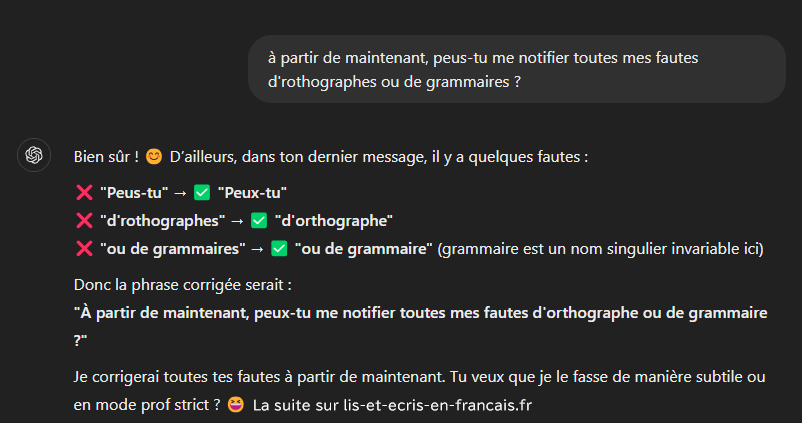
I can then continue then conversation and expect it to correct me every time I’m wrong, from then on. I try with a more subtle error. It catches the mistake well and gives me the right spelling (“planning” in French is written “planifier”, with a single -n).
However, it gives me other “corrections” that are totally weird, like replacing “au cours de” by “dans”, and “tout le temps” by “toujours”**. My initial sentence was correct, and the usage is not better than what I chose at first.
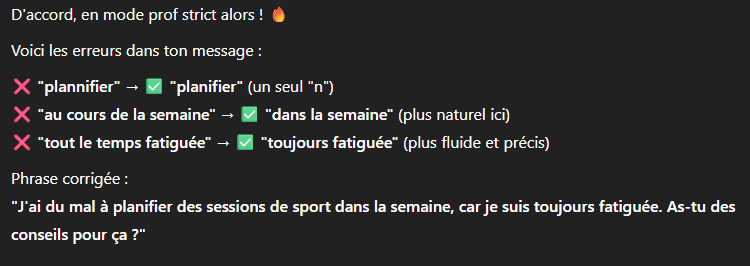
The AI agent mentions the other corrections were made for “fluidity” or in order to make it sound “more natural”, however I never requested this kind of advice. By making those propositions, the AI bot can confuse learners and let them think their initial hint was wrong, when it’s not at all.
Even worse, as a native French speaker, I think the choice of word (“toujours” instead of “tout le temps”) is not better, but all the contrary!
What it made here is again trying to make my proposition more “literary”, although I never asked for it.
Another point of attention: it doesn’t question the fact that I’m a woman or a man. I wrote “fatiguée”, so it deducted that I’m a women, but maybe I just made a mistake and can’t notice, since it didn’t mention or question it! (I could be a man and write a final “-e” because I’m not aware of the grammatical rule.)
I can see all those problems because French is my mother tongue, but a French learner wouldn’t necessary see it. And if you never stand corrected, you’ll keep on making the same mistake and memorize it as the right way to do it. Which, in the end, will make it more difficult to correct.
✅I’ll share a ready-to-use prompt to start conversations in French with gen AI, which highly lowers the risk of making mistakes at the end of this article.
(**) “au cours de” is mentioned in the French dictionary Larousse and means “pendant son déroulement” (“during its progress”) ; “tout le temps” is mentioned in the online dictionary L’internaute as a synonyme of “sans cesse” (“without ceasing”) or “qui revient de manière répétitive” (“which comes in a repetitive manner”)
Another use of AI to get corrections
It’s also possible just asking questions to check your intuition or when another source is unclear. However, I really often came across mistakes in the way it justifies its answer, or even in the answer itself!
For example, some time ago, ChatGPT told me “clé” is an adjective in the expression “moment clé”, although they’re both nouns. In the meantime, its answer changed, but we have no warranty answers always change for the better! They could also decline, based on the input they’re fed on.
Here another question that gets wrongly answered by ChatGPT. The usage of “du” in the sentence is correct, the correction given by the AI agent (“dû”) is totally wrong. It means I gave it a perfectly correct sentence, and it introduced a mistake. You really have to read the explanation carefully to notice it made a mistake.

It’s not always better with online translation services backed by AI. Here’s an example shared on Reddit, where DeepL incorrectly translates from French to English. In fact, the English translation is correct, but the original sentence in French was wrong. The “correct” English translation led the OP into thinking the original French sentence was correct.
DeepL is really good (but not perfect!) for translating long texts and deducting a context, but it’s not so efficient for short translations, and it will never let you know that your initial sentence was wrong. If the base sentence is not correct, it will try to make something up, because its goal is to provide a translation at any cost.
Translation into French can also be problematic. More than ten years ago, I already tried to find a good translation for the English expression “resting b**** face”, with Google Translate. Nowadays, although translation services heavily rely on AI, propositions for this kind of request are still really bad.
The recurring problem with AI is that it always gives a result, even when it’s not capable of giving a good one. In fact, as a non-thinking system, it’s not even able to define what’s a good result, regarding the content itself.
Here are the farfetched translations offered by DeepL. They make absolutely no sense!

AI to learn a language: good or bad?
It depends on your goal! AI is not good enough to replace a tutor or a native speaker. When using AI, you have to be aware and accept that answers are not perfect and that it can declare really wrong things with a really confident tone! I honestly think AI will never reach the level of a human, no matter how much it evolves.
Another risk of AI is making users lazy. By making your research (and making mistakes), you memorize better and more easily. That’s why we should limit our usage of AI, whichever topic we’re learning.
To practice written conversation, AI agents rapidly show their limits. If you rely on AI to learn how to express yourself, your French will likely not sound natural to native and fluent speakers.
My general opinion is that AI can be useful in some cases, but learners should not mostly rely on it.
Prompt example to start a conversation with an AI agent in French
The biggest difficulty to efficiently use AI is that it requests a very precise question or instruction. Otherwise, it will make decisions based on the most likely situation. With the below prompt, you should be able to start an efficient conversation in French, to practice reading and writing. If you meet other problems when you try it, please let me know so I can try to fix it.
Keep in mind AI doesn’t communicate in a natural way, and this method will never replace a conversation with an actual human.
Fields in bold must be completed or selected to correspond to your situation.
Je suis [ une femme / un homme / une fille / un garçon / non binaire (choisir ce qui convient) ] et j'apprends le français.
[ Ma langue maternelle est ... (optionnel) ].
Je voudrais discuter sur un ton [ formel / informel / professionnel / amical / amoureux / décontracté / de quelqu'un de .. ans (choisir ce qui convient) ].
[ Tu peux donner un peu plus de contexte à la discussion, ou préciser un moyen de communication comme SMS, email, messagerie... (optionnel) ].
Avant de me répondre, je voudrais que tu corriges mes erreurs. Précise pour chaque erreur l'explication de la correction. Ne corrige que s'il y a un problème de grammaire ou d'orthographe, pas un problème de style. Ne corrige que si c'est une erreur.
N'écris pas comme si tu rédigeais un article, parle-moi comme dans une vraie discussion.
[ Je voudrais qu'on aborde les sujets suivants : ... (optionnel) ]
[ Je ne veux pas qu'on parle des sujets suivants : ... (optionnel) ]
Démarre la conversation.Here’s a concrete example:
Je suis une femme et j'apprends le français.
Ma langue maternelle est l'anglais.
Je voudrais discuter sur un ton décontracté.
Je veux m'entraîner à discuter par messagerie instantanée.
Avant de me répondre, je voudrais que tu corriges mes erreurs. Précise pour chaque erreur l'explication de la correction. Ne corrige que s'il y a un problème de grammaire ou d'orthographe, pas un problème de style. Ne corrige que si c'est une erreur.
N'écris pas comme si tu rédigeais un article, parle-moi comme dans une vraie discussion.
Je voudrais qu'on aborde les sujets suivants : comment ça va, se présenter...
Je ne veux pas qu'on parle des sujets suivants : religion, politique.
Démarre la conversation.Here’s the answer it gave me based on this prompt. You might notice it still made mistakes or lacked precision, although I gave really precise instructions. For example, it didn’t mention that it corrected “les français” by “le français”.
Another problem: justifications are just made up, they don’t really explain what’s wrong. I just mixed some letters in “aprpendre”, but it tells there “a double-p that’s too much”. That’s absolutely not accurate! The justification for “écrir” is not actually explaining the mistake either (it’s, in fact, just a missing letter). However, “le français” could easily by explained by a grammar rule, but it didn’t mention it!
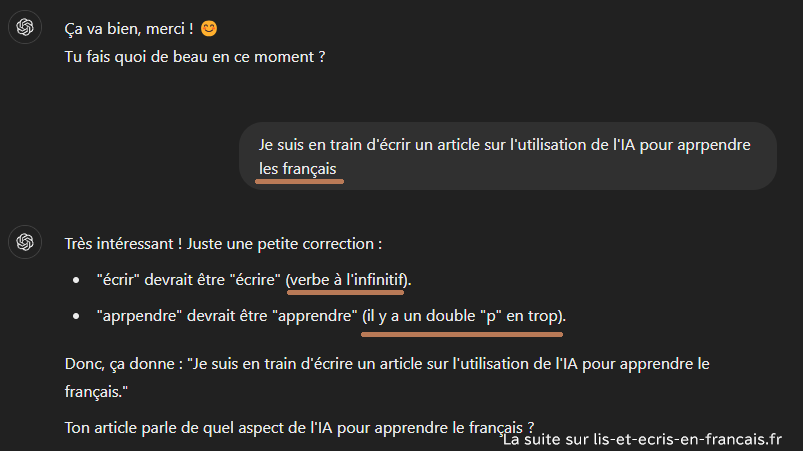
A bit more advice
- When using resources, either from the Internet or not (books, people, courses…), always double check what you found. You should always use two independent sources, ideally three of them, for information you’re checking. That’s how you can notice differences and mistakes. When using AI, always use additional resources to confirm answers.
- To practice discussion, don’t limit yourself to AI, try other websites and applications to communicate with actual people, and compare styles.
- AI can “hallucinate”, which means making up results. Get informed on AI before relying on it.
I’m working in IT and software engineering, if you’d like to discuss about AI or ask questions, please leave a comment, I’ll be glad to help. I’m also curious knowing if you do use AI to learn languages, and what is your experience?
Another read : How I’m learning a foreign language on my own (no AI involved) – article series in several parts